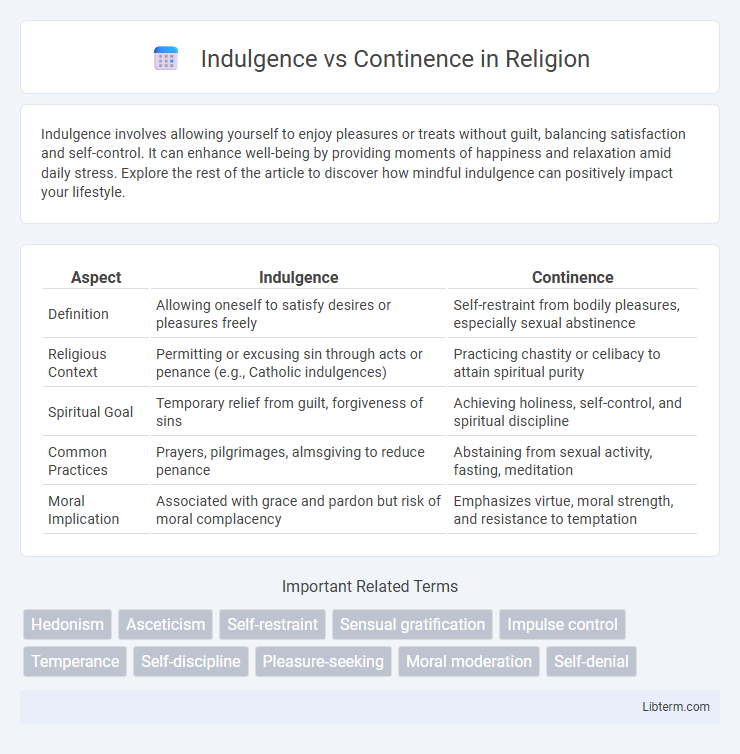Indulgence involves allowing yourself to enjoy pleasures or treats without guilt, balancing satisfaction and self-control. It can enhance well-being by providing moments of happiness and relaxation amid daily stress. Explore the rest of the article to discover how mindful indulgence can positively impact your lifestyle.
Table of Comparison
| Aspect | Indulgence | Continence |
|---|---|---|
| Definition | Allowing oneself to satisfy desires or pleasures freely | Self-restraint from bodily pleasures, especially sexual abstinence |
| Religious Context | Permitting or excusing sin through acts or penance (e.g., Catholic indulgences) | Practicing chastity or celibacy to attain spiritual purity |
| Spiritual Goal | Temporary relief from guilt, forgiveness of sins | Achieving holiness, self-control, and spiritual discipline |
| Common Practices | Prayers, pilgrimages, almsgiving to reduce penance | Abstaining from sexual activity, fasting, meditation |
| Moral Implication | Associated with grace and pardon but risk of moral complacency | Emphasizes virtue, moral strength, and resistance to temptation |
Understanding Indulgence and Continence: Key Definitions
Indulgence refers to the tendency to allow gratification of basic and natural human desires related to enjoying life and having fun, emphasizing pleasure and self-expression. Continence represents self-control and restraint, prioritizing discipline and the regulation of impulses to achieve long-term goals. Understanding indulgence and continence is crucial for analyzing cultural behaviors and individual decision-making patterns in various contexts.
Historical Perspectives on Indulgence and Continence
Historical perspectives on indulgence and continence have shaped societal norms, with indulgence often linked to periods of hedonism in ancient Rome and Renaissance Europe, while continence was emphasized in Stoic philosophy and early Christian teachings. Victorian era prudence exemplified a cultural shift toward restraint and moral discipline, contrasting with earlier indulgent practices. These shifting attitudes reflect broader historical dynamics between pleasure, self-control, and social order.
The Psychological Roots of Indulgence
The psychological roots of indulgence often stem from unmet emotional needs and a desire for immediate gratification, which can serve as coping mechanisms for stress or trauma. Research in psychology highlights how dopamine release reinforces indulgent behaviors, creating a cycle of reward-seeking that undermines self-control and continence. Understanding these neural and emotional drivers is essential for developing strategies to balance indulgence with long-term well-being.
The Virtue of Continence in Modern Society
The virtue of continence, characterized by self-control and disciplined restraint, is essential for maintaining mental clarity and emotional stability amid modern society's abundant temptations. Practicing continence supports physical health, enhances decision-making processes, and fosters long-term satisfaction by curbing impulsive behaviors linked to overindulgence. In a digital age saturated with instant gratification, cultivating continence strengthens resilience against addictive patterns and promotes balanced living.
Cultural Influences: East vs West on Self-Control
Cultural influences significantly shape self-control, with Western societies often emphasizing individual autonomy and indulgence as a form of personal freedom, while Eastern cultures prioritize continence through communal harmony and discipline. The concept of indulgence in the West aligns with consumerism and immediate gratification, whereas Eastern traditions rooted in Confucianism and Buddhism advocate for restraint and long-term well-being. These contrasting cultural paradigms influence behavioral norms, psychological well-being, and social expectations surrounding self-control and gratification.
Indulgence and Continence in Religious Traditions
Indulgence in religious traditions often refers to the practice of granting remission of temporal punishment for sins, prominently seen in Catholicism where the Church issues indulgences to encourage repentance and spiritual renewal. Continence, characterized by self-restraint and abstinence from bodily pleasures, is fundamental in many faiths including Christianity, Hinduism, and Buddhism, promoting spiritual discipline and moral purity. The tension between indulgence and continence reflects broader theological debates about grace, penance, and the path to salvation or enlightenment.
The Neuroscience of Resisting Temptation
The neuroscience of resisting temptation reveals that the prefrontal cortex plays a critical role in self-control by regulating impulses and evaluating long-term rewards over immediate gratification. Studies using fMRI show increased activity in this brain region during tasks requiring continence, highlighting its involvement in delaying indulgence. Dopamine pathways, which drive reward-seeking behavior, are modulated through cognitive strategies that strengthen executive function and reduce susceptibility to temptation.
Indulgence vs Continence in Everyday Decisions
Indulgence involves giving in to immediate desires and gratification, often prioritizing short-term pleasure over long-term benefits. Continence reflects self-control and restraint, enabling individuals to make disciplined choices that support health, productivity, and well-being. Everyday decisions, such as dietary choices, spending habits, and time management, illustrate the ongoing tension between indulgence and continence in shaping personal outcomes.
The Impact on Personal Wellbeing and Relationships
Indulgence often leads to immediate gratification but can contribute to emotional instability and decreased self-control, negatively impacting personal wellbeing. Continence, characterized by self-discipline and restraint, promotes long-term mental health and resilience, fostering stronger, more meaningful relationships. Research links continence to improved stress management and higher relationship satisfaction, emphasizing its role in sustainable personal and social harmony.
Striking the Right Balance: Practical Strategies for Life
Striking the right balance between indulgence and continence involves mindful decision-making and recognizing personal limits to maintain well-being. Practical strategies include setting clear boundaries, practicing moderation in habits such as eating, spending, and leisure, and regularly reflecting on long-term goals to prevent impulsive choices. Integrating self-discipline with occasional rewards fosters sustainable happiness and resilience in daily life.
Indulgence Infographic

 libterm.com
libterm.com